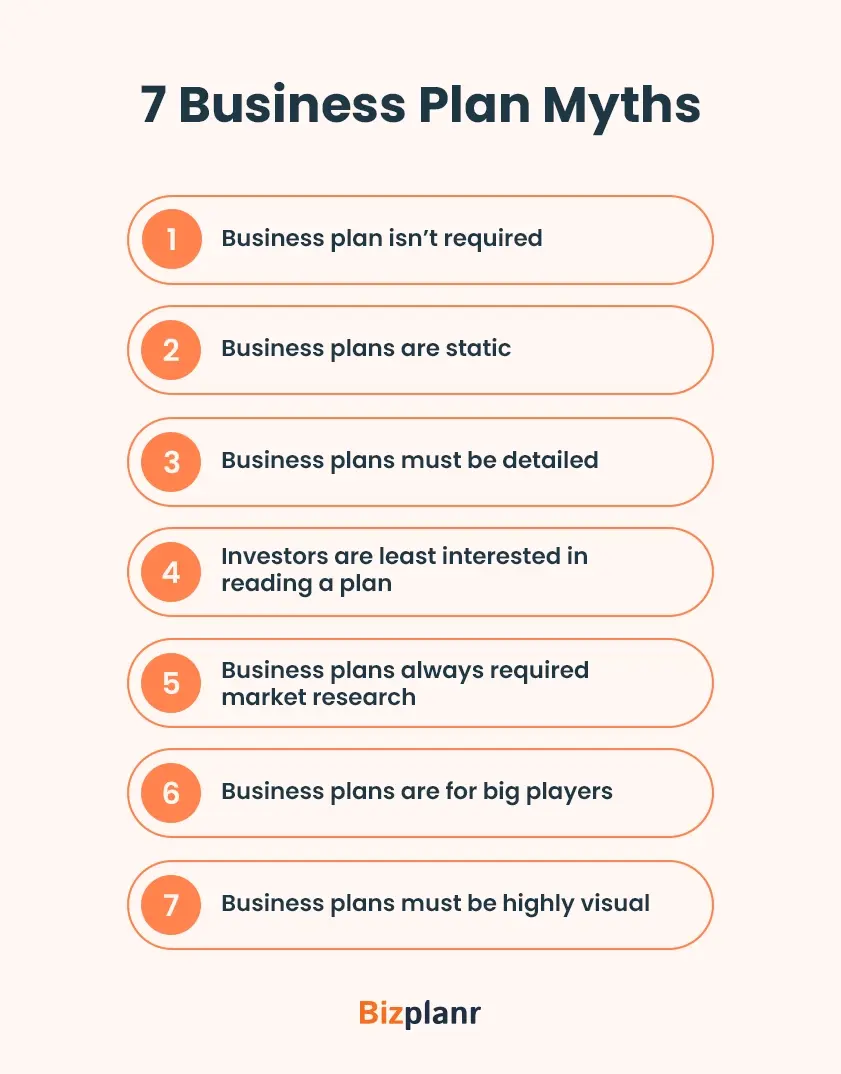Business plans have been the old faithful of the corporate world. They hold the power to guide companies to set goals and woo investors.
But let's be honest: They have been catching some bad press lately. You’ve probably even heard whispers that they’re outdated or simply useless.
Well, these whispers are dead wrong.
Sure, we get it; it can be a bit complicated to write a business plan. But the payback is worth it.
In this article, we’ll debunk seven business plan myths. By reading through it, you’ll know why basic business planning is still essential for you as an entrepreneur.
Myth #1: Business plan isn’t required
We’ve heard this so many times, usually followed by, "Oh, business plans are just for getting investors on board." And sure, if you’re not searching for investment, why care, right?
Wrong.
Business plans aren't just to impress investors. It’s like the GPS for your business journey. Running a business without a plan feels like hitting the road with no map, no directions, and just vibes.
Effective business planning helps you figure out your goals and mission. Plus, it makes it super easy for everyone on your team to get on the same page.
So, yes, you absolutely need a business plan.
Myth #2: Business plans are static
Some people think once you've written your plan, that's the end of the story.
But good business planning is a living thing! It needs to grow and change as your business does.
When market trends shift, customers develop new tastes, you gain different business knowledge or unexpected opportunities pop up, your business plan needs to flex and adapt.
So it's important to keep your plan relevant by revisiting and changing it regularly. This way, your company stays stable and ready to tackle whatever comes its way.
Myth #3: Business plans must be detailed and long
There's another misconception that you need a big business plan document. Sure, being thorough is important, but drowning in unnecessary details? Not so much.
Your business plan can take whatever form is most right, even if that's just a few lists and tables.
Just think about it. Will you ever go through a 100-page business plan if you were an investor?
Not really, right?
So, prepare a mean and lean business plan. Focus on what really matters like your value proposition, target market, competitive landscape, and those all-important financial projections.
Myth #4: Investors will be least interested in reading your business plan
There’s another common belief that investors just don’t bother reading your business plans. Some say they’ll barely glance at it, or maybe they’ll skip it altogether.
That’s all a big lie!
If your executive summary–the opening pitch in your business plan–doesn't grab their attention, they might not read on. But if you’ve put your heart and soul into crafting a killer business plan and that summary hooks them, they’ll dive in.
Serious investors will definitely dig deep, scrutinizing every detail to see if your company is worth their money.
Myth #5: Your business plan will always require a market research
Lots of established businesses often skip the fancy market research part when creating their plans.
And honestly? That's usually okay.
Why? Because a seasoned business owner understands their market inside out.
However, it's still wise to double-check things to see whether they are on track. A well-thought-out business plan keeps you updated on the latest market trends without needing to constantly do in-depth research.
But there are times when market research becomes important. For example, if you’re a startup hunting for investors or a business applying for a loan, you'll need to prove your market potential with some solid research.
But for mature businesses that already have a good grasp of their market, the constant need for market research isn’t really necessary. They can plan and move forward without it.
Myth #6: Business plans are only for big players
Small business owners often feel business planning is for big corporations. But that's where they make a mistake. Business plans are like roadmaps for your business journey, regardless of your size.
A business plan will outline your goals, target market, and growth strategies to keep you on course. It can also be an invaluable tool for pulling investors and securing some good funding, making it easier to turn your entrepreneurial dream into reality.
Myth #7: Your business plan must be highly visual
Yes, charts and graphs look great as well as put a point across much more easily. But that doesn’t mean you need to fill up your business plan with visual after visual.
A strong business plan needs to communicate a clear vision, quality market analysis, strong financial projections, and a solid operational strategy. That’s all.
Paying extreme attention to visuals will only overpower the essential elements of your business plan—drastically reducing your chances of impressing the reader.
Moreover, a client or stakeholder is highly likely to care about how thorough your analysis is instead of how many pie charts you’ve put in.
So, go on. Use a chart here and graph there, but don’t let it replace your well-articulated content and research.
Summing it up
Business planning is full of myths that make it sound way more confusing than reality. Hopefully, this guide has busted some of those common myths and set the record straight on what a business plan is all about.
Remember your business plan must be structured well and include all the key strategy points about your company. And if you want to make a professional business plan in no time then an AI business plan generator is your go-to tool.
Get Your Business Plan Ready In Minutes
Answer a few questions, and AI will generate a detailed business plan.
Frequently Asked Questions
Is writing a business plan hard?
Yes, writing a business plan the old-school way with spreadsheets and word processors can be a real pain. But with AI business plan generators and modern software, creating bare-bones business plans is easier than ever. These tools guide you through the process, offer templates, and even handle the financial calculations for you.
How often should I update my business plan?
Review and update your business plan at least once a year, especially if your company is still in its early stages.
How much time does it take to make a comprehensive business plan?
Creating a solid business plan takes time. Depending on the research required, it could take a few days. Market research, defining your target audience, and outlining your income and expenses often require the most time.







